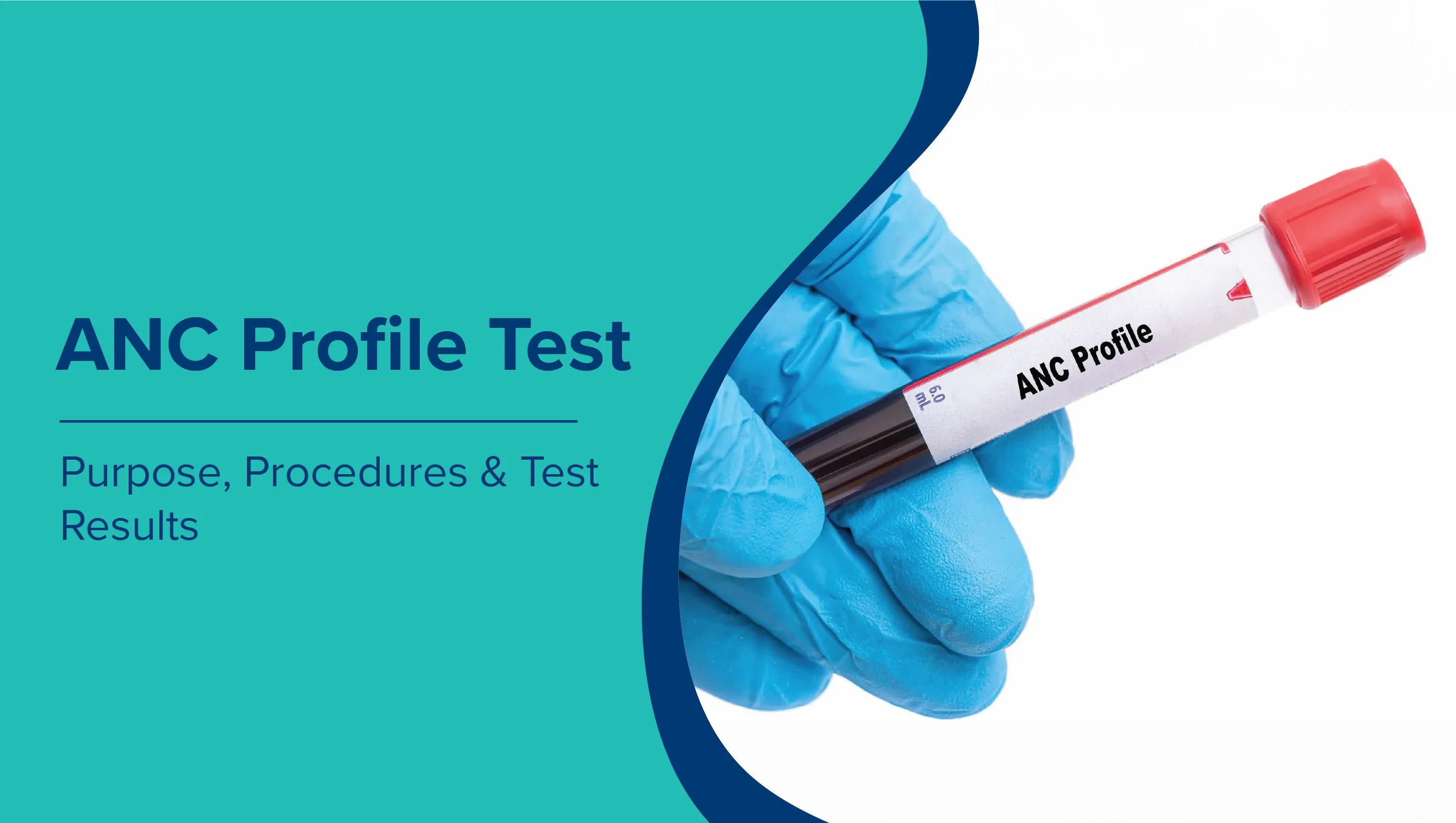The ANC Profile Test, or Antenatal Care Profile Test, is an essential diagnostic panel conducted during pregnancy to assess the health of the expectant mother and monitor the well-being of the developing baby. This comprehensive blood and urine test package helps detect underlying health conditions, nutritional deficiencies, infections, and other complications that could affect pregnancy outcomes. Typically recommended in the first trimester and repeated as necessary, the ANC Profile Test supports early diagnosis and timely intervention to ensure a healthy pregnancy journey.
What Is the ANC Profile Test?
ANC stands for Antenatal Care. The ANC Profile Test is a battery of tests done mostly during pregnancy as part of routine prenatal screening. It evaluates multiple physiological and biochemical parameters to provide a holistic picture of the mother’s health and to identify any risks to the baby.
Unlike a single test that measures one component, the ANC Profile consists of several tests packaged together that commonly include blood tests, urine analysis, and sometimes additional screenings depending on individual factors. This panel includes assessments for anemia, blood sugar, infections, immune status, and organ function, among others.
Purpose of the ANC Profile Test
The ANC Profile Test serves several vital purposes:
- Assess Maternal Health: Detect conditions like anemia, gestational diabetes, thyroid disorders, and nutrient deficiencies that can impact pregnancy.
- Screen for Infectious Diseases: Identify infections such as HIV, hepatitis B, syphilis, and rubella, which can pose risks to the mother and fetus.
- Monitor Immune and Organ Function: Evaluate blood counts and liver/kidney function to ensure the mother’s body supports a healthy pregnancy.
- Detect Blood Group and Rh Status: This is crucial to prevent Rh incompatibility which can cause complications.
- Monitor Pregnancy-Related Complications: Detect early signs of preeclampsia, gestational hypertension, and other pregnancy disorders.
- Guide Treatment and Interventions: Provide data for healthcare providers to customize care, dietary advice, supplements, or therapies.
By systematically screening for various parameters, the ANC Profile helps mitigate risks and optimize pregnancy outcomes, ensuring the mother and baby receive appropriate care.
ANC Profile Test List / ANC Profile Test Name — What Tests Are Included?
The ANC Profile is a comprehensive panel consisting of multiple tests that vary slightly depending on the healthcare provider or clinical guidelines but generally include the following key components:
Blood Tests
- Complete Blood Count (CBC): Evaluates hemoglobin levels, red and white blood cells, and platelet counts to check for anemia, infections, or clotting issues.
- Blood Group and Rh Typing: Determines the blood group and Rh factor to manage Rh incompatibility risks.
- Blood Sugar Tests (Fasting, Postprandial, or Random): Screens for gestational diabetes or pre-existing diabetes.
- Thyroid Stimulating Hormone (TSH): Checks thyroid function, important because thyroid imbalances can affect pregnancy.
- Hemoglobin Electrophoresis (HPLC): Detects hemoglobinopathies like thalassemia.
- Infectious Disease Markers:
- HIV 1 and 2: Screening for Human Immunodeficiency Virus.
- Hepatitis B Surface Antigen (HbsAg): Detects hepatitis B infection.
- Venereal Disease Research Laboratory (VDRL) / Rapid Plasma Reagin (RPR): Screens for syphilis.
- Rubella Antibody Test: Checks immunity to rubella (German measles).
- Other Viral Markers: May include tests for hepatitis C or cytomegalovirus as per risk.
- Erythrocyte Sedimentation Rate (ESR): A general marker of inflammation.
- Serum Iron, Vitamin B12, and Vitamin D: Evaluate nutritional status.
Urine Tests
- Urine Routine and Microscopy: Checks for urinary tract infections, proteinuria (which can signal preeclampsia), glucose, ketones, and other abnormalities.
How Is the ANC Profile Test Performed?
The procedure for the ANC Profile Test involves collecting samples of blood and urine:
- Blood Sample Collection: A phlebotomist draws blood from a vein in your arm using standard sterile techniques. The blood is drawn into specified tubes for different tests.
- Urine Sample Collection: You may be asked to provide a mid-stream urine sample into a sterile container.
- Laboratory Analysis: The samples are sent for processing using automated analyzers, immunoassays, and microscopy depending on the test.
Preparation generally does not require fasting unless specified by the healthcare provider, especially if blood sugar fasting values are to be measured. Most tests can be performed quickly, and results are often available within 12 to 48 hours.
What Do ANC Profile Test Results Mean?
Interpreting the ANC Profile Test results involves comparing each parameter with its established reference range:
- Normal Results: Indicate that the mother’s health is adequate for pregnancy, and no immediate intervention is needed.
- Abnormal Results: May indicate anemia (low hemoglobin), elevated blood sugar suggesting gestational diabetes, thyroid dysfunction, infections such as HIV or hepatitis, nutritional deficiencies, or urinary infections. These abnormalities require further evaluation and management.
Healthcare providers use these results to tailor prenatal care. For example:
- Anemia: May prompt iron and folic acid supplementation.
- High blood sugar: Leads to diabetes management plans.
- Positive infectious disease tests: Requires specific antiviral or antibiotic treatments and counseling.
- Rh-negative blood group: Management with Rh immunoglobulin to prevent sensitization.
What are the Components Included in ANC Profile Test
The ANC (Antenatal Care) Profile Test is a comprehensive panel designed to assess the health of a pregnant woman and the developing fetus. The exact tests may vary by provider but generally include the following key parameters:
Blood Tests:
- Complete Blood Count (CBC): Measures hemoglobin, red and white blood cells, platelet count to check for anemia, infections, and clotting function.
- Blood Group and Rh Typing: Determines blood group (A, B, AB, O) and Rh factor to prevent Rh incompatibility complications.
- Blood Sugar Tests: Typically includes fasting blood sugar (FBS), postprandial blood sugar (PPBS), or random blood sugar (RBS) to screen for gestational diabetes.
- Thyroid Stimulating Hormone (TSH): Checks thyroid function since hypothyroidism or hyperthyroidism can affect pregnancy.
- Hemoglobin Electrophoresis (HPLC): Screens for hemoglobin disorders such as thalassemia or sickle cell anemia.
- Infectious Disease Markers:
- HIV 1 and 2: Human immunodeficiency virus screening.
- Hepatitis B Surface Antigen (HBsAg): Detects hepatitis B infection.
- Venereal Disease Research Laboratory (VDRL) or Rapid Plasma Reagin (RPR): Screens for syphilis.
- Rubella IgG Antibody: Determines immunity to rubella (German measles).
- Erythrocyte Sedimentation Rate (ESR): A general test for inflammation.
- Vitamin and Mineral Levels: Includes serum iron, vitamin B12, and vitamin D to identify nutritional deficiencies.
Urine Tests:
- Urine Routine and Microscopic Examination: Detects urinary tract infections, proteinuria (which may indicate preeclampsia), glucose, ketones, and other abnormalities.
Additional Tests (depending on risk factors or practice):
- Other viral markers such as hepatitis C screening.
- Ultrasound scans to monitor fetal growth and development.
- Additional biochemical or immunological tests as needed.
ANC Profile Test Procedure (Step-by-Step)
- Sample Collection Preparation:
- Usually, fasting for 8–10 hours may be advised especially if blood sugar fasting is part of the test. Follow your doctor’s instructions.
- Inform your healthcare provider about any medications or supplements you are currently taking.
- Stay hydrated and wear comfortable clothing for easy blood draw.
- Blood Sample Collection:
- A trained phlebotomist cleans the puncture site (usually inside of the elbow) with an antiseptic.
- A tourniquet is applied above the site to make the vein more visible.
- A sterile needle is inserted into the vein to draw blood, typically collecting several tubes depending on tests required.
- After the blood draw, the needle is removed, and a bandage is applied to the puncture site.
- Blood samples are labeled and sent to the laboratory for analysis.
- Urine Sample Collection:
- A clean-catch midstream urine sample is collected in a sterile container, usually during the same visit.
- The sample is sent to the lab for routine and microscopic examination.
- Laboratory Testing:
- The collected samples undergo various automated and manual testing processes, including biochemical analysis, immunoassays, microscopy, and culture if needed.
- Results are typically available within 24 to 48 hours, depending on the tests and lab.
- Result Interpretation:
- Your healthcare provider will review the results to assess maternal health, identify any abnormalities, and design appropriate management or intervention plans.
Importance of ANC Profile Test During Pregnancy
Pregnancy is a critical time when both maternal health and fetal development must be closely monitored. The ANC Profile Test plays a pivotal role in:
- Early Detection of Health Issues: Many pregnancy complications such as anemia, gestational diabetes, and infections can be asymptomatic initially but have serious implications.
- Reducing Risks of Pregnancy Loss or Fetal Complications: Early diagnosis allows interventions that reduce risks of preterm labor, fetal growth restriction, and congenital infections.
- Improving Outcomes: Ensures timely treatment and follow-up for maternal conditions that can affect labor and delivery.
- Guiding Nutritional and Lifestyle Counseling: Results related to vitamins and minerals help optimize maternal nutrition.
- Ensuring Safe Delivery: Recognition of blood group incompatibilities or infections informs delivery planning to prevent neonatal complications.
When Is the ANC Profile Test Recommended?
The ANC Profile Test is ideally done during the first trimester (around 8 to 12 weeks of pregnancy) and may be repeated later based on risk assessment, clinical findings, or if complications arise. It is recommended:
- For all pregnant women as part of routine antenatal screening.
- If there are symptoms such as vaginal bleeding, severe abdominal pain, decreased fetal movement, or persistent nausea.
- For those with a history of chronic medical conditions, previous pregnancy complications, or family history of genetic disorders.
- When infections are suspected or if there are signs of immune disorders.
Preparing for the ANC Profile Test
Preparation is relatively straightforward:
- Follow your doctor’s instructions: Some tests within the profile may require fasting or specific timing.
- Avoid medications unless approved: Inform your doctor about any ongoing medications.
- Stay hydrated and be ready to provide urine sample when requested.
- Wear comfortable clothing for easy blood draw.
ANC Profile Test Price and Availability
The cost of the ANC Profile Test varies based on the number of parameters included and the diagnostic center. Generally, the pricing ranges from INR 1,000 to INR 3,000 in India for a comprehensive package. Many hospitals and diagnostic centers offer the test as part of prenatal packages, and it may be covered under health insurance plans.
Conclusion
The ANC Profile Test is a cornerstone of comprehensive prenatal care, enabling detection of health risks timely and supporting the well-being of both mother and baby. By encompassing a spectrum of vital tests—from blood counts and infection screenings to metabolic and nutritional evaluations—this profile helps healthcare providers guide effective interventions during pregnancy.
If you are pregnant or planning to conceive, discussing the ANC Profile Test with your healthcare provider will ensure you receive appropriate, timely, and personalized care for a healthy pregnancy and delivery.















